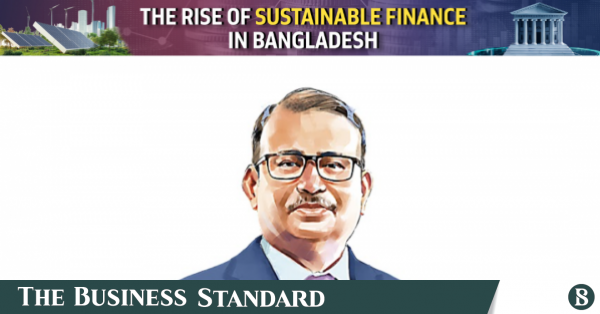From financing LEED-certified factories to pioneering green deposit products, EBL is reshaping the future of banking in Bangladesh by making sustainability central to growth
Ali Reza Iftekhar, MD & CEO of Eastern Bank Ltd. Sketch: TBS
“>

Ali Reza Iftekhar, MD & CEO of Eastern Bank Ltd. Sketch: TBS
When I look at the future of sustainable financing in Bangladesh, I see tremendous promise as well as immense responsibility. Climate change is no longer a distant issue—it is already reshaping our economy and society. In this context, the banking sector must step up and play a transformative role by channeling capital into green, low-carbon, and climate-resilient activities.
What excites me is the clear shift in mindset across the industry. Sustainability is no longer seen as a “good-to-have” feature; it has become a business imperative. Demand for renewable energy, energy-efficient technologies, sustainable agriculture, and green infrastructure is growing rapidly, and I believe banks will be at the centre of enabling this transition. The future success of our sector will depend on how effectively we align financing with both national climate goals and global sustainability standards.
Infograph: TBS
“>

Infograph: TBS
At Eastern Bank PLC (EBL), we have already placed sustainability at the heart of our growth strategy. In 2024, green lending accounted for 35% of our total term loan portfolio—nearly double the previous year’s 18%—while almost 90% of our overall portfolio qualified as sustainable finance. These are not just numbers; they represent a shift in the way we think about value creation. To date, we have financed more than 200 energy and resource efficiency projects and supported 23 LEED-certified factories and buildings, helping businesses embrace cleaner and smarter operations.
Infograph: TBS
“>

Infograph: TBS
One project I am particularly proud of is our financing of a landmark 20 MW solar power plant in Muktagacha. This initiative directly supports Bangladesh’s transition towards renewable energy and provides a model for future investments in the sector. Beyond large-scale projects, we are also extending support to sustainable agriculture by working through MFIs and NGOs that reach grassroots farmers. This ensures that climate-resilient solutions benefit not just big companies but also smallholder farmers and rural communities.
Importantly, our commitment to sustainability is not limited to what we finance—it also defines how we operate. Our Head Office is a green building, equipped with solar glass panels, rainwater harvesting, and wastewater treatment facilities. Across EBL, we have embraced paperless banking, digital transformation, and plastic-free premises. These steps have allowed us to reduce our resource use and carbon footprint significantly. For me, living the sustainability we finance is just as important as the projects we support.
Looking ahead, our ambition is to strengthen our position as a frontrunner in sustainable banking. We plan to expand our portfolio in renewable energy, green infrastructure, sustainable agribusiness, and low-carbon transition finance. Equally important, we are investing in advanced tools for carbon accounting and climate risk assessment, which will ensure our financing decisions remain resilient in the face of both physical and transition climate risks. We also intend to deepen our partnerships with global DFIs and climate funds so that we can mobilise larger pools of affordable capital for Bangladesh. My ultimate vision is for sustainable finance to move away from being a niche offering and become the mainstream driver of economic growth across all sectors.
Innovation is central to this journey. We are in the process of developing new green deposit and green lending products that will allow customers to directly support environmentally friendly projects. Through our EBL Startup Explorer programme, in partnership with Startup Bangladesh, we are financing impact-driven startups that are bringing breakthrough technologies and services to market. I also find our collaboration with DHL particularly inspiring. Through the DHL Go Green Plus initiative, which reduces 30% of carbon emissions from trade document transport, we are embedding sustainability into financial services in creative and practical ways.
Of course, promoting sustainable finance is not without challenges. The biggest hurdle remains affordability. Green technologies often require significant upfront investment, and many businesses—particularly SMEs—struggle to access affordable long-term finance. Awareness is another issue. A large portion of SMEs, for instance, are yet to fully appreciate that adopting energy-efficient solutions can actually lower operational costs while reducing emissions. From the banking perspective, data availability continues to be a challenge, especially when it comes to measuring climate risks and financed emissions. And on a national level, we still need more technical expertise in green project design and implementation to attract large-scale international climate finance.
This is why regulatory support will be critical in shaping the next phase of our journey. Bangladesh Bank has already taken some commendable steps with its Sustainable Finance Policy, green refinancing schemes, and new climate risk disclosure guidelines. Yet I believe stronger support will be needed in three areas. First, incentives such as tax benefits or more concessional credit lines must be introduced to make green financing more affordable, particularly for SMEs and agriculture. Second, we need clearer sectoral roadmaps for renewable energy, agriculture, and transport so that banks can align their financing strategies with national priorities. And third, there must be sector-wide capacity-building, supported by the central bank, to ensure every institution has the technical expertise required to assess climate risks and scale up sustainable finance.
If these enabling measures are put in place, I am confident Bangladesh’s banking sector can truly become a catalyst for sustainable growth. At EBL, we are determined to play our part in driving this transformation—not just for our business, but for the economy, the environment, and future generations.


